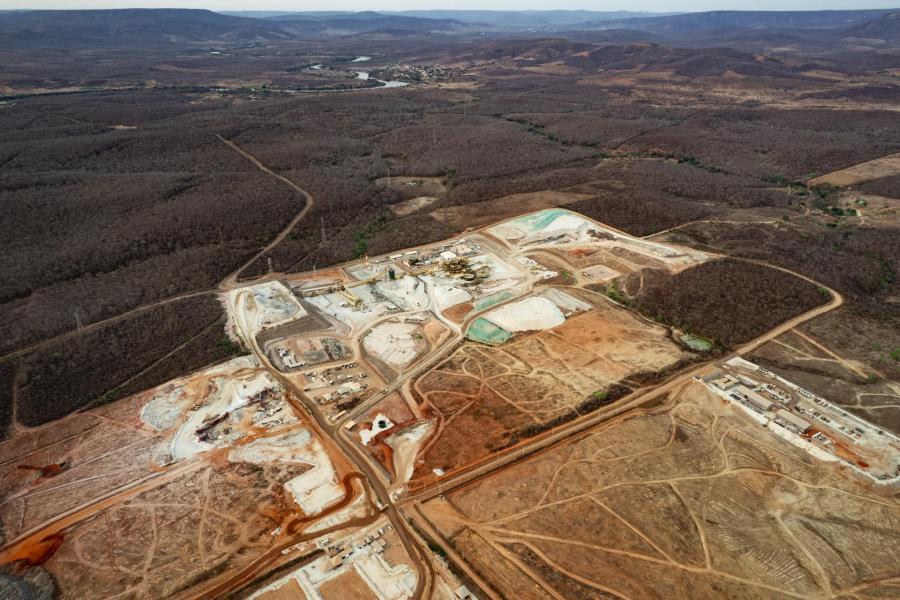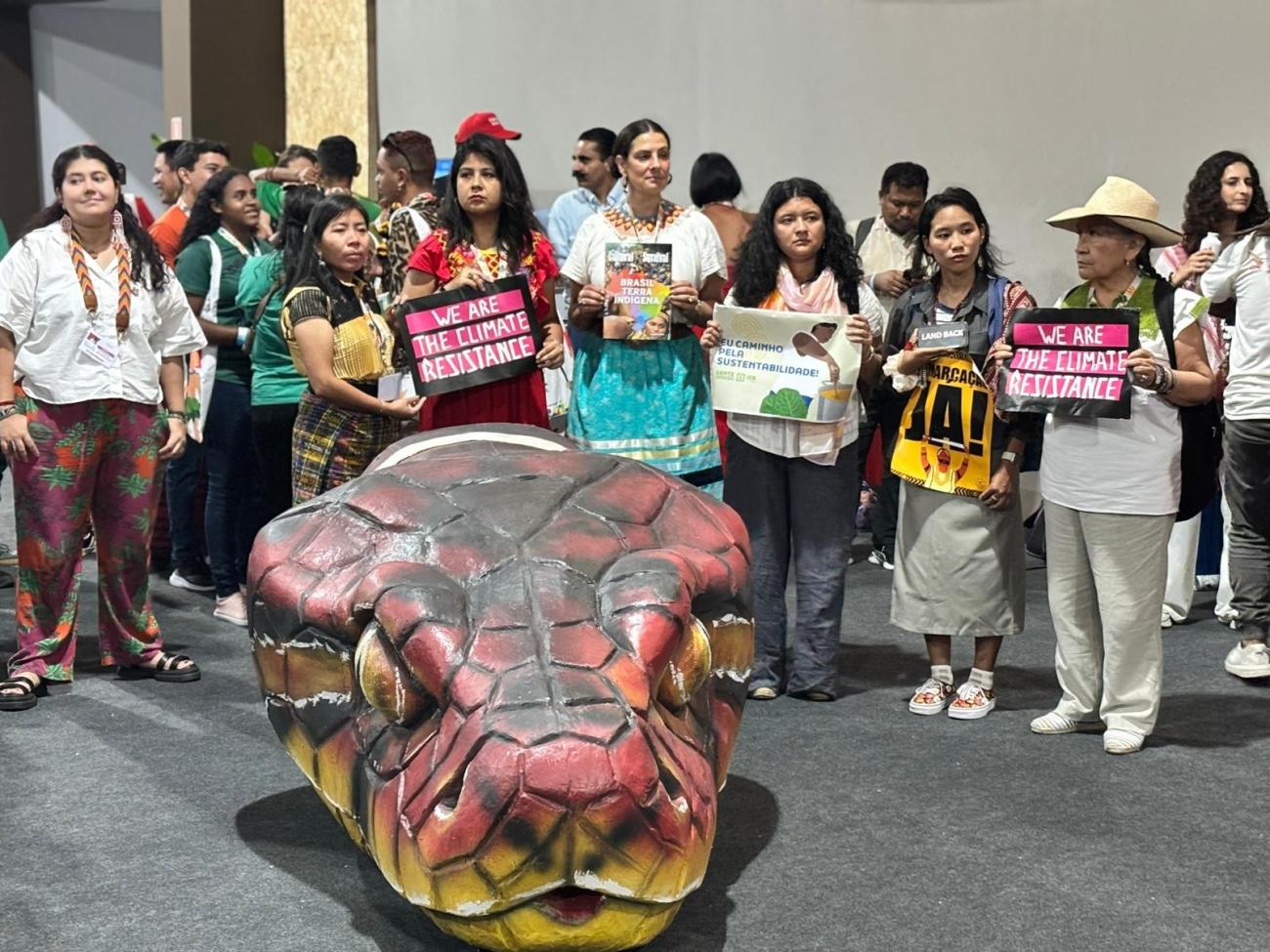
Por Equipo de CS
La semana pasada marcó la conclusión de las negociaciones climáticas, que tuvieron lugar del 10 al 21 de noviembre de 2025 en Belém, Brasil. Durante esta semana, la delegación de Cultural Survival contribuyó a la COP30 con un análisis crítico que vincula investigación rigurosa con incidencia estratégica, con el objetivo de apoyar y posicionar las demandas de nuestras organizaciones aliadas y del movimiento indígena más amplio que exige acción climática que incluya salvaguardas sólidas de derechos humanos, particularmente para los Pueblos Indígenas y el Consentimiento Libre, Previo e Informado (CLPI) como pilar fundamental en todas las iniciativas de acción climática.
La 30ª sesión de la Conferencia de las Partes de la Convención Marco de las Naciones Unidas sobre el Cambio Climático (CMNUCC COP30) se llevó a cabo en el territorio de los Pueblos Indígenas de Brasil, quienes, para decepción de muchos, no han sido plenamente involucrados en el proceso de negociación debido al acceso limitado al área oficial de negociación.
Uno de los logros más destacados, que no se reflejará en los documentos adoptados, es la atención prestada a los Pueblos Indígenas de esta región y del mundo en su conjunto. Por primera vez en muchos años de negociaciones climáticas, los medios de comunicación mundiales, las delegaciones gubernamentales y los participantes de la Conferencia Climática en general han prestado tanta atención al tema de la participación plena y efectiva de los Pueblos Indígenas, así como a la inclusión de sus derechos e intereses en futuras decisiones y acciones.
El tema de las violaciones de los derechos indígenas se planteó en todas partes, como resultado directo de la participación activa de los Pueblos Indígenas a lo largo de las negociaciones y su exigencia de derechos en las calles. El reconocimiento y la protección de los territorios de los Pueblos Indígenas son clave para combatir el cambio climático y mitigar sus efectos, al igual que la aplicación garantizada del principio de Consentimiento Libre, Previo e Informado ante cualquier acción que afecte los territorios, recursos, cultura y vidas de los Pueblos Indígenas.
Es por eso que los Pueblos Indígenas están exigiendo que la demarcación de tierras (la definición y establecimiento de límites de territorios que tradicionalmente pertenecen a estos pueblos, para asegurar sus derechos a estos territorios y los recursos naturales que se encuentran en ellos) se incluya como uno de los objetivos de las negociaciones climáticas.
El 17 de noviembre, el primer día de la segunda semana de negociaciones, fue marcado como el Día de los Pueblos Indígenas. En este día, el gobierno brasileño anunció la creación de nuevas áreas protegidas que abarcan cientos de miles de hectáreas y habitadas por miles de personas de los Pueblos Indígenas Mura, Tupinambá de Olivença, Pataxó, Guarani-Kaiowá, Munduruku, Pankará y Guarani-Mbya. Para los Pueblos Indígenas, esto es motivo de alegría y esperanza, así como una oportunidad para preservar sus territorios, biodiversidad, forma de vida tradicional y cultura.
Además, el Mecanismo de Bosques Tropicales para Siempre (TFFF, por sus siglas en inglés) fue finalmente lanzado oficialmente en la COP28 en Dubái. El Banco Mundial servirá como administrador interino del TFFF. El lanzamiento del TFFF puede ser uno de los mejores resultados de la COP30, ya que una de las condiciones del fondo es que al menos el 20% de sus recursos se asignen a los Pueblos Indígenas o a proyectos que los beneficien.
La Ministra de Asuntos Indígenas de Brasil, Sonia Guajajara, dijo: "El TFFF reconoce de manera audaz y justa el papel vital de los Pueblos Indígenas y las comunidades tradicionales en la protección de los bosques. Garantizar que al menos el 20% de los recursos vaya directamente a estos custodios es un logro histórico y un paso decisivo hacia la igualdad y el reconocimiento del conocimiento ancestral". Por un lado, el 20% es un buen primer paso, pero por otro, es solo el 20% para aquellos para quienes la protección forestal es una prioridad vital.

La delegación de CS, Camila Romero (Quechua) y Polina Shulbaeva (Selkup) con S.E. Noura Hamladji, Secretaria Ejecutiva Adjunta de la CMNUCC.
El martes 18 de noviembre, el Foro Internacional de Pueblos Indígenas sobre Cambio Climático (IIPFCC) realizó una acción en el área oficial de negociación (Zona Azul), donde los delegados indígenas expresaron sus demandas por el derecho a administrar sus tierras, territorios, aguas y recursos, la necesidad de reducir urgentemente y detener la deforestación, aumentar los programas de acción en el campo de la conservación y restauración de la biodiversidad, y mejorar la sostenibilidad ambiental para combatir el cambio climático. Los participantes en la acción también citaron ejemplos de mayor presión sobre los defensores de derechos humanos indígenas que protegen sus tierras, su criminalización, secuestros y asesinatos. Se hizo énfasis en la necesidad de proporcionar acceso directo a financiamiento para acciones y objetivos determinados por los propios Pueblos Indígenas, así como la aplicación de estándares legales mínimos consagrados en la Declaración de las Naciones Unidas sobre los Derechos de los Pueblos Indígenas y otras obligaciones internacionales en el campo de los derechos de los Pueblos Indígenas.
A lo largo de la segunda semana, el equipo de Cultural Survival realizó trabajo de incidencia, tanto en la Zona Azul oficial durante las negociaciones como en eventos paralelos, incluidas conversaciones de alto nivel, así como fuera de estos eventos, a través de reuniones con líderes indígenas brasileños. Nos reunimos y hablamos en eventos paralelos de alto nivel, realizando trabajo de incidencia dirigido a promover los derechos de los Pueblos Indígenas, especialmente en Brasil.

Camila Romero (Quechua) con el Sr. Aloisio Lopes Pereira Melo, Secretario Nacional de Cambio Climático del Ministerio de Medio Ambiente y Cambio Climático de Brasil.
En el Pabellón de la CMNUCC, Camila Romero (Quechua), Asociada del Fondo Guardianes de la Tierra de Cultural Survival, compartió sus reflexiones en el panel 'El Futuro del Multilateralismo y la Gobernanza Climática' organizado por Climate Emergency Collaboration. El panel de alto nivel discutió cómo la cooperación climática global necesita cambiar para enfrentar los desafíos actuales. Camila destacó el papel de la juventud indígena en la configuración de la agenda climática y la importancia de avanzar en mecanismos directos de participación para los Pueblos Indígenas en la CMNUCC. También fue una oportunidad para compartir el documento de incidencia con representantes del Ministerio de Medio Ambiente y Cambio Climático de Brasil.
Una de las reuniones fue una discusión sobre la contaminación del Río Catete (en el estado que alberga la COP 30) y su impacto en los Pueblos Indígenas Xikrin, liderada por Edson Krenak (Krenak), Gerente de Proyecto Especial de Cultural Survival Brasil, que es una de las crisis humanitarias, socioambientales y etnoculturales más graves en curso en la región sureste del estado de Pará. Esta situación ha sido objeto de demandas civiles públicas presentadas por la Fiscalía Federal (FPP) contra la empresa minera Vale S.A., el Gobierno Federal y el Estado de Pará por los daños causados a los Pueblos Indígenas Shikrin do Catete. La resolución de este conflicto debe incluir, además del reconocimiento oficial y público de Vale SA de su responsabilidad por la contaminación ambiental y el daño a la salud de los Pueblos Indígenas, la creación de condiciones apropiadas para remediar el daño causado, restaurar el medio ambiente, proporcionar apoyo médico, compensación financiera apropiada y desarrollo de infraestructura.
Los miembros del personal de Cultural Survival coorganizaron y participaron en varios eventos paralelos con la Coalición SIRGE dedicados a amplificar las voces de las luchas de los Pueblos Indígenas en sus territorios debido a la extracción de los llamados minerales "críticos" en la transición hacia una economía verde.
Desde el Ártico hasta Australia, América del Norte y Brasil, los Pueblos Indígenas denunciaron la violación de sus derechos y la destrucción ambiental que las empresas mineras están causando, sin consulta efectiva ni respeto a su derecho al Consentimiento Libre, Previo e Informado. Exigieron que las corporaciones y los estados dejen de convertir sus territorios en zonas de sacrificio. La transición hacia una economía baja en carbono y resiliente al clima no debería ocurrir a expensas de las vidas y derechos de los Pueblos Indígenas, así como de los derechos de la Naturaleza.
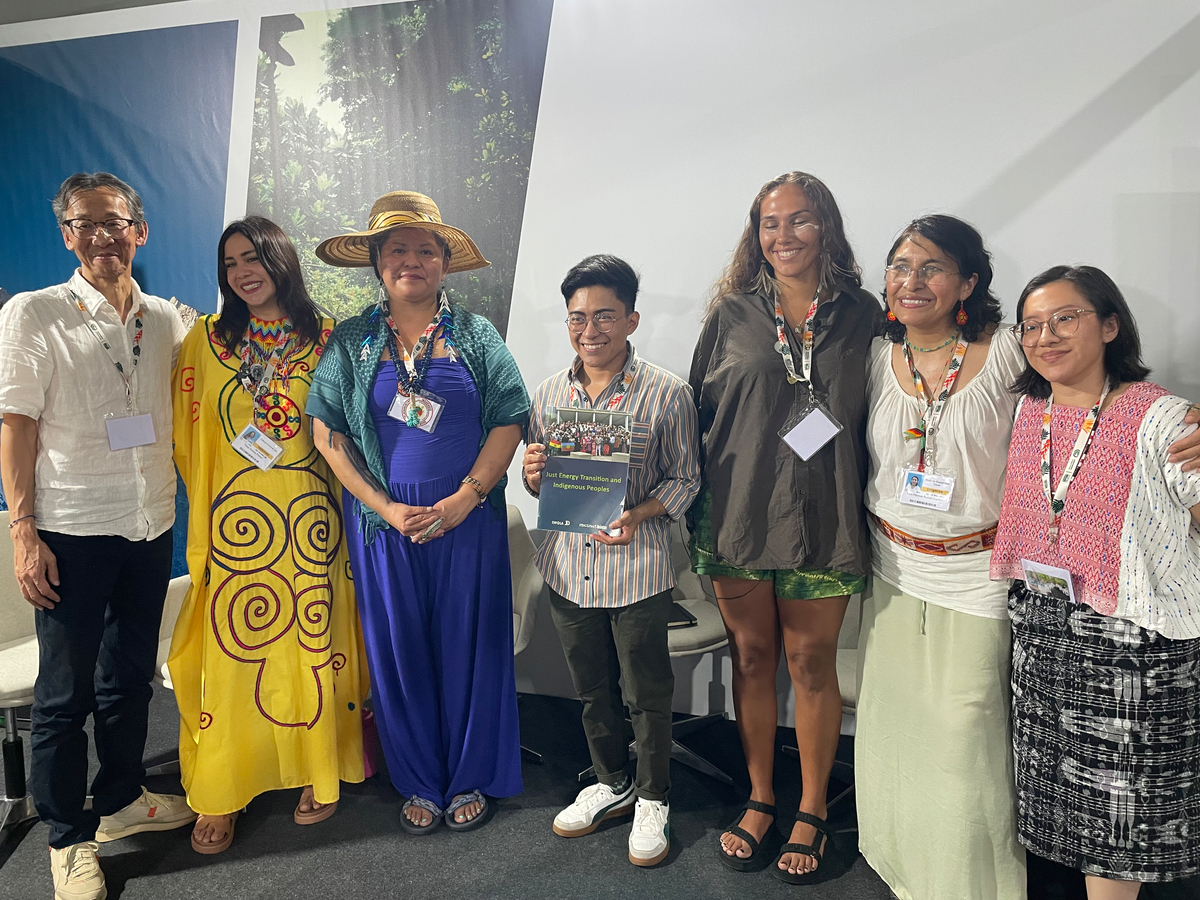 Miembros de la Coalición SIRGE en un evento paralelo.
Miembros de la Coalición SIRGE en un evento paralelo.
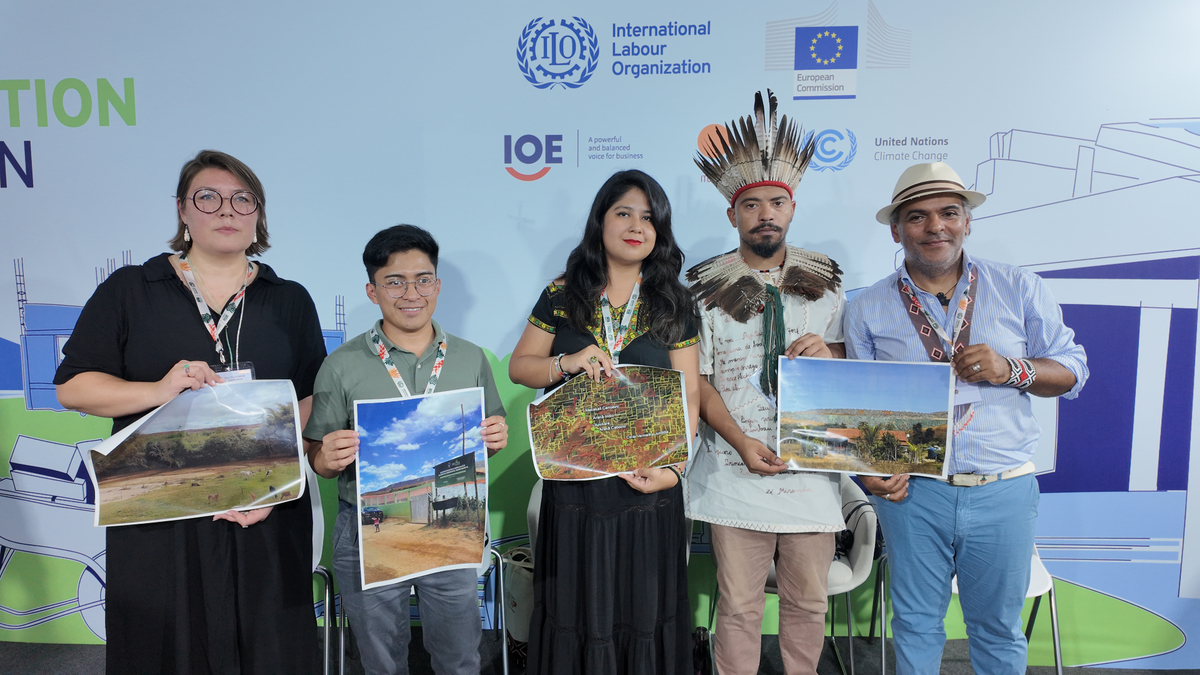
Sara Olsvig (Saami), Bryan Bixcul (Maya Tzʼutujil), y la delegación de CS: Mariana Kiimi Ortiz (Ñuu Savi/Mixteca), Djalma Ramalho (Aranã Caboclo) y Edson Krenak (Krenak)
Cultural Survival lanzó el informe "El Precio de lo Verde: Litio, Corredores de Minerales y Granos, y las Zonas de Sacrificio de Brasil Construidas sin Consentimiento Libre, Previo e Informado" en la COP do Povo, un espacio alternativo para que los Pueblos Indígenas y la sociedad civil discutan y reflexionen juntos sobre sus luchas con los efectos del cambio climático. El texto presentó estudios de caso sobre la violación de los derechos de los Pueblos Indígenas y Quilombolas bajo el discurso de transición energética y desarrollo, como el complejo Grota do Cirilo de Sigma Lithium en el Valle del Jequitinhonha y el ferrocarril FICO en el Cerrado, revelando cómo estos emprendimientos reconfiguran territorios, cuerpos vividos y modos de existencia frente a la expansión de la minería, agronegocios y proyectos de infraestructura a gran escala.
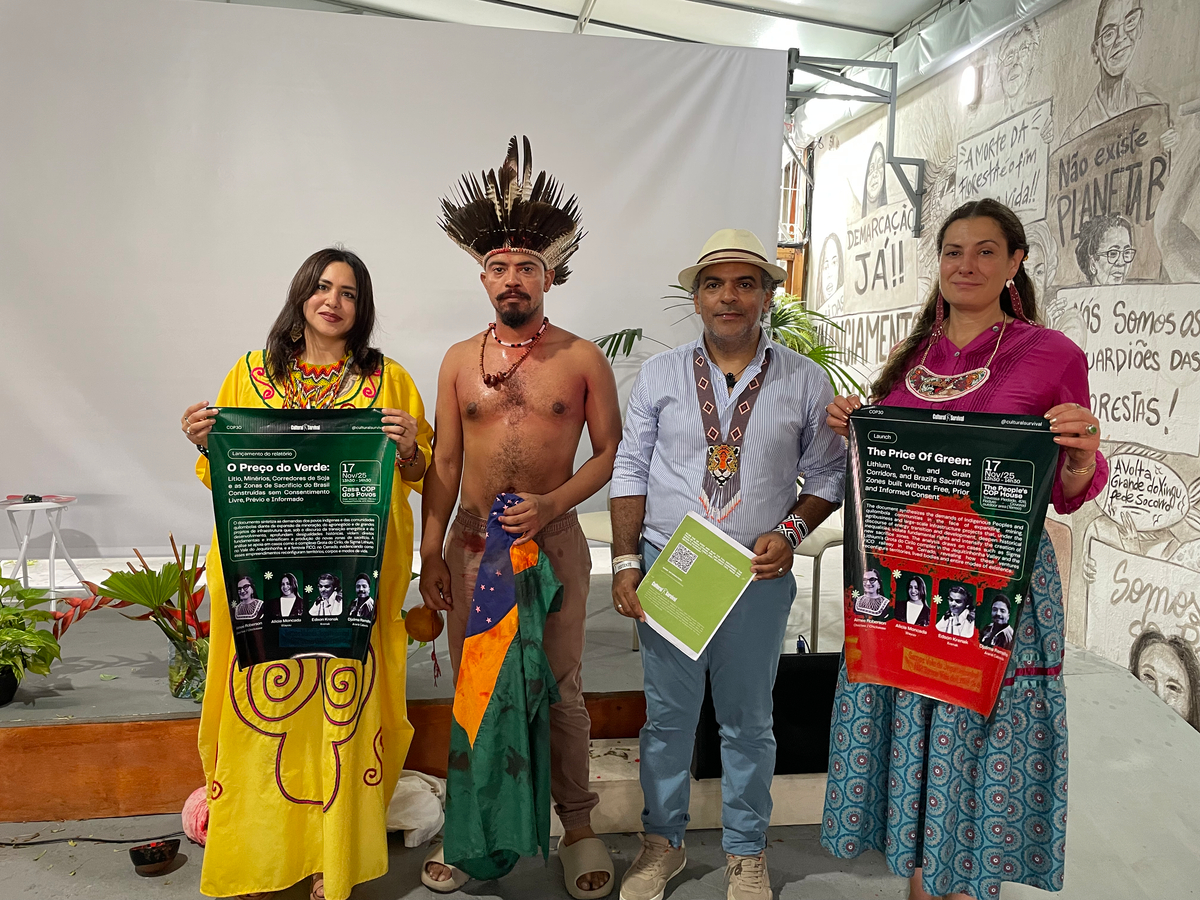
Delegación de CS: Alicia Moncada (Wayuu), Djalma Ramalho (Aranã Caboclo), Edson Krenak (Krenak), Aimee Roberson (Choctaw y Chickasaw)
Durante el lanzamiento del documento de incidencia, Djalma Ramalho (Aranã Caboclo), Activista de Cultural Survival para Brasil, realizó una acción ceremonial artivista que hizo visible la realidad de los Pueblos Indígenas en todo Brasil y más allá que sufren los impactos sobre sus derechos y los derechos de la naturaleza de la minería de litio.
En la COP30, compartimos el documento de incidencia con Relatores Especiales de la ONU y la Ministra de Pueblos Indígenas de Brasil, Sonia Guajajara. Nuestro objetivo era claro: asegurar que las recomendaciones basadas en evidencia amplifiquen y refuercen las demandas expresadas por los Pueblos Indígenas presentes en la COP30. No puede haber una transición justa si se construye sobre la violación de los derechos de los Pueblos Indígenas.
Es imposible no mencionar el incendio que literalmente estalló en el área de negociación de la COP30: fue indicativo de la situación en el proceso de negociación sobre temas clave. El incendio estalló en la Zona de Pabellones (Zona Azul oficial de negociación), y esto no es una expresión figurativa, sino literal. Según los videos publicados en internet, el techo de plástico se incendió instantáneamente. En cuestión de segundos, el fuego se había extendido varios metros, causando conmoción y pánico entre los delegados en el área. Los participantes tanto en las Zonas Verde como Azul fueron evacuados. La fila masiva para salir provocó una multitud de personas, y los que estaban atrás empujaban a los que estaban adelante, queriendo salir del lugar inseguro.
Según una carta oficial de la CMNUCC, "El incendio fue contenido en aproximadamente seis minutos. Las personas fueron evacuadas de manera segura. Trece personas recibieron atención médica en el lugar por inhalación de humo y recibieron la atención médica necesaria. La Zona Azul se cerró temporalmente mientras el departamento de bomberos realizaba una evaluación integral de seguridad".
El viernes 21 de noviembre, el último día oficial de negociaciones, las negociaciones comenzaron según lo planeado, excepto que la Zona Oficial de Pabellones estaba completamente cerrada a los visitantes. A mitad del día, el Foro Internacional de Pueblos Indígenas sobre Cambio Climático (IIPFCC) llevó a cabo una conferencia de prensa para recordar a las Partes participantes sus obligaciones y reflexionar sobre las posiciones de liderazgo de los Pueblos Indígenas sobre los documentos en discusión.
Lea la declaración de cierre del Foro Internacional de Pueblos Indígenas sobre Cambio Climático.
